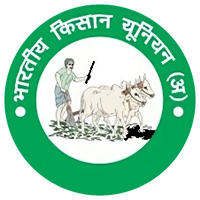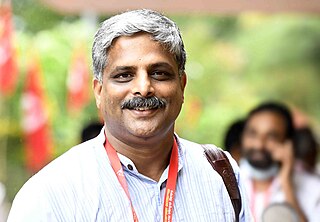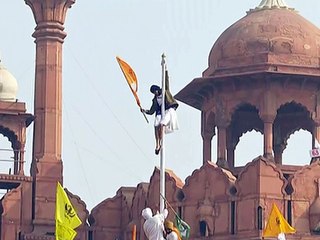Beawar is a city in Beawar district of Indian state of Rajasthan. As of 2011, the population of Beawar is 342,935. It is located 60 kilometres south from Ajmer, the divisional headquarter and 184 kilometres (114 mi) southwest of the state capital Jaipur, amidst Aravali hills. Nearest airports are Jodhpur (145 km), Kishangarh and Jaipur (190 km). It is also connected by RSRTC operated buses to all parts of Rajasthan, and neighboring Delhi NCR, Ahmedabad (Gujarat), Gwalior. It also has railway connectivity with Delhi, Mumbai, Ahmadabad, Bangalore (bi-weekly), Haridwar, Dehradun (weekly), Bareilly and Muzzafarpur.

Aruna Roy is an Indian social activist, professor, union organiser and former civil servant. She is the president of the National Federation of Indian Women and founder of the Mazdoor Kisan Shakti Sangathan.
Mahatma Gandhi National Rural Employment Guarantee Act 2005 or MGNREGA, earlier known as the National Rural Employment Guarantee Act or NREGA, is an Indian social welfare measure that aims to guarantee the 'right to work'. This act was passed on 23 August 2005 and was implemented in February 2006 under the UPA government of Prime Minister Manmohan Singh following tabling of the bill in parliament by the Minister for Rural Development Raghuvansh Prasad Singh.
The Bharatiya Kisan Sangh (BKS) is an Indian farmers' organization that is politically linked to the Rashtriya Swayamsevak Sangh. BKS was founded by Dattopant Thengadi in 1978. As of 2000, Rashtriya Swayamsevak Sangh claimed BKS had a quarter million members, organized in 11,000 villages and 301 districts across the country. The organization is dominated by landed gentry.
The first Social Audit was carried out in Sweden (1985–88) by John Fry and Ulla Ressner, worklife researchers at the Centre for Swedish Working Life (Arbetslivscentrum) and published in Sweden in 1988 by Allmäna Förlaget, Stockholm under the title "Social Revision av ett Ämbetsverk". It was the result of a three-year study of Sweden's central bureaucracy - The National Labour Market Board (Arbetsförmedlingen). The study was based on interviews and questionnaires with over 1,000 employees at all levels of the organisation throughout the country and became the subject of debate in the Swedish Riksdag (Parliament). Its focus was to assess the correspondence between the work experiences of employees and management on the one hand, and the legislated and collectively agreed upon objectives for service, work environmental and managerial policies in its established definition of effectivity in the workplace. In short, it was an assessment of the institutionalisation of a Democratic Rationality. As a result of that critical research regarding the functioning of the Swedish National Labour Market, then celebrated as a model for organisational change within all state bureaucracies, the two researchers were pressured to resign their positions and paid to emigrate to Canada.
Nikhil Dey is an Indian social activist. He works for the Mazdoor Kisan Shakti Sangathan, Suchna Evum Rozgar Adhikar Abhiyan and NCPRI. He has worked for Right to Information, Mahatma Gandhi National Rural Employment Guarantee Act, Lokpal bill and Right to Food and other Human Rights organisations.
National Campaign for People's Right to Information (NCPRI) was established in 1996 to advocate for a legal backing to citizens right to information. This resulted in the historic and pro-people law - the Right to Information Act, 2005. More recently, this movement has also campaigned for Grievance redressal bill and Whistleblowers protection bill. It is a network of organisations and individuals who use the Right to Information law to demand transparency and accountability of government, but also support the use of the RTI in various other sectors to demand accountability.
National Alliance of People's Movements is an alliance of alter-globalisation activist groups in India. It is an umbrella organisation for various civil society organisations and individuals working towards similar goals.
Swami Kumaranand, born Dvijendra Kumar Naag, was an Indian politician and leader of Communist Party of India. He was a key builder of the communist movement in Rajputana and Madhya Bharat.

Gorelal Manishi was an Indian social activist, Angika language writer, former Bihar Government Engineering Services Officer and former president of Bihar Engineering Services Association. He was also the board member of Kosi Bund Erosion Judicial Enquiry Commission as constituted by the Govt. of Bihar. He was a civil engineering graduate and also he had earned bachelor's degree in Law (LLB) while he was in engineering services.
Anurag Singh is an Indian documentary filmmaker known for his socio-political, human rights oriented films. He has worked with mass peoples’ movements, including the Narmada Bachao Andolan, National Campaign for People's Right to Information, and Mazdoor Kisan Shakti Sangathan His most famous films are "Kaise Jeebo Re", and "Right to Information", which have been screened and won awards internationally.
Nauroti Devi is an Indian Dalit woman social activist and politician from Rajasthan, India. She was elected Sarpanch of her village Harmada in 2010.

Anjali Bhardwaj is an Indian social activist working on issues of transparency and accountability. She is a co-convenor of the National Campaign for People's Right to Information (NCPRI) and a founding member of Satark Nagrik Sangathan. She works on issues related to right to information, Lokpal, whistleblower protection, grievance redress, and right to food.
Freedom of information act 2002 was the precursor to Right to Information Act, 2005 of Parliament of India. The main weakness of this act was that it did not acknowledge the right to information of the people. Consequently, it provided for appeals only within the government bodies. It barred the jurisdiction of the courts and did not ensure any appeal with any independent body.

Bharatiya Kisan Union (BKU) is a farmer's representative organisation in India. It was founded by Chaudhary Charan Singh from the Punjab Khetibari Union which became its Punjab branch. The union is affiliated to the All India Kisan Sangharsh Coordination Committee and Via Campesina. The national headquarters of the union is located in Sisauli, Muzaffarnagar, Uttar Pradesh.

Dr. Vijoo Krishnan is an Indian peasant leader, writer on Agrarian Issues and General Secretary of the All India Kisan Sabha. He is a central committee member of Communist Party of India (Marxist). He is also part of the six-member central secretariat of CPI(M). He is one of the key organiser of Bhoomi Adhikar Andolan.
Samyukta Kisan Morcha (SKM), formed in November 2020, is a coalition of over forty Indian farmers' unions to coordinate satyagragh against the three farm acts initiated in September of the same year.

The 2021 Farmers' Republic Day protest was a protest on 26 January 2021 at Delhi. Part of the 2020–2021 Indian farmers' protest, it turned violent when the police and the BJP goons started to attack protestors. The protestors also deviated from the parade to take the parde towards Red Fort. The protest took place on the 72nd Republic Day against the decision by Narendra Modi-led National Democratic Alliance (NDA) to implement three farm acts.
Narayan Bareth is an veteran Indian journalist, political analyst and the former State Information Commissioner of Rajasthan. As a journalist, he has been associated with various news groups including BBC, The Asian Age, and The Pioneer. He has served as Professor of Journalism at both the University of Rajasthan's Centre for Mass Communication and Haridev Joshi University of Journalism and Mass Communication.

Common Cause is a non-governmental organisation based in New Delhi, India, that works on probity in public life and governance reforms. Common Cause focuses on defending and fighting for the citizens’ rights. It takes up public causes through advocacy, research and public interest litigation.








